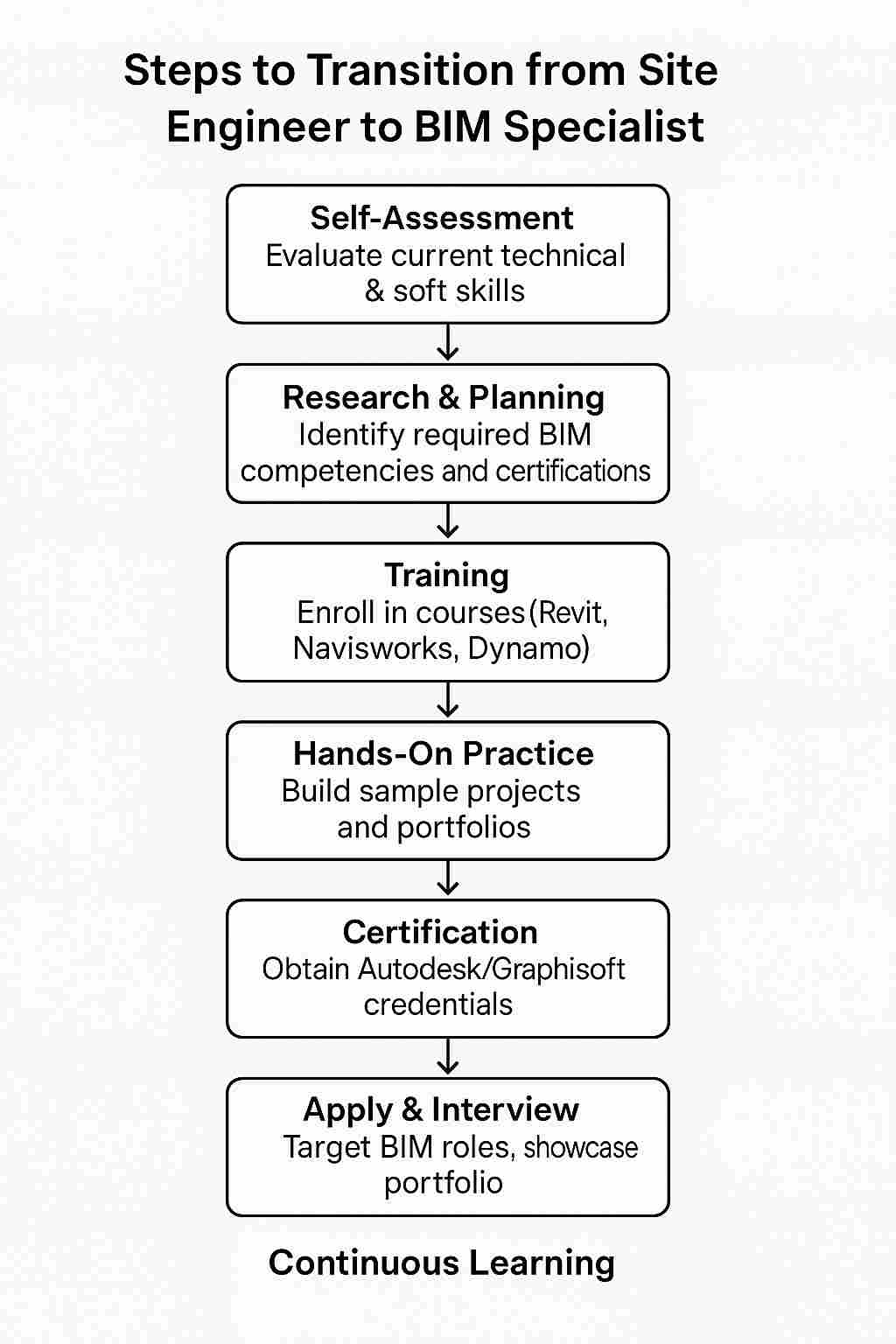Last Updated on April 7, 2025 by Admin
The construction industry is undergoing a profound digital transformation. Technologies such as Building Information Modeling (BIM), digital twins, and AI‑powered analytics are redefining how projects are designed, executed, and managed. Investment in digital twin technology, for instance, is fueling AI applications that deliver real‑time construction insights, optimize resource management, and enhance safety monitoring on site
ConstructionCareerHub App is LIVE — built ONLY for construction careers. Don’t apply with a weak resume.
Get ATS-ready Resume Lab + Interview Copilot + Campus Placement Prep (resume screening, skill gaps, interview readiness) — in minutes & Other advanced features.
Explore Smarter Construction Career Tools →Quick check. Big impact. Start now.
By 2025, BIM adoption is projected to surge: the global BIM market is expected to grow from $7.39 billion in 2024 to $8.59 billion in 2025 at a 16.3% CAGR, while another forecast pegs it at $10.3 billion by 2026 (11.6% CAGR). More than 70% of construction firms in developed countries are already leveraging BIM for project planning and management. With these trends in mind, the question arises: Is a career shift from Site Engineer to BIM Specialist worth it in 2025? This post dives deep into both roles, examines the benefits and challenges of transitioning, and provides actionable guidance for professionals considering this path.
Table of Contents
Understanding the Roles
Site Engineer
A Site Engineer is the backbone of on‑site operations. Key responsibilities include:
- Interpreting drawings and specifications to lay out site works.
- Supervising subcontractors and laborers to ensure quality and safety.
- Monitoring materials and equipment usage.
- Coordinating with project managers and stakeholders for timely progress.

BIM Specialist
A BIM Specialist leverages digital tools to create, manage, and analyze 3D models throughout a project’s lifecycle. Typical duties involve:
- Developing and maintaining BIM models in software like Revit and Navisworks.
- Collaborating with architects, engineers, and contractors to integrate design data.
- Conducting clash detection and constructability reviews.
- Generating 4D/5D simulations for scheduling and cost estimation.
- Establishing BIM standards and workflows to optimize collaboration.

Why Consider a Shift to BIM in 2025
1. Enhanced Career Growth & International Opportunities
- Global Demand: Governments and large developers increasingly mandate BIM for infrastructure and commercial projects, driving demand for qualified BIM coordinators, modelers, and managers.
- Mobility: BIM skills are transferable across borders. Regions like North America, Europe, the Middle East, and Asia‑Pacific show robust BIM uptake, opening doors to international assignments and remote consultancy roles
2. Competitive Salary Prospects
- Site Engineer (US): Median salary around $95,686/year
- BIM Engineer (US): Median salary around $99,309/year, with senior roles often exceeding $120,000
Salary Growth: BIM sector salaries are projected to rise 10–20% annually in developed markets and 20–30% in emerging economies due to accelerated digital adoption.
3. Future‑Proofing Your Career
As digital twins, AI, and IoT become mainstream, traditional site roles risk obsolescence. BIM Specialists are at the heart of this ecosystem—building the data backbone that powers advanced analytics, predictive maintenance, and smart construction management.
4. Skill Enhancement & Professional Development
Transitioning to BIM hones both technical and managerial competencies:
- Technical: Mastery of Revit, Navisworks, Dynamo scripting, and clash detection tools.
- Analytical: Data interpretation for 4D/5D simulations and lifecycle management.
- Collaborative: Leading interdisciplinary teams through digital workflows.
Challenges to Be Aware Of
1. Need for Upskilling
- Software Proficiency: Gaining fluency in Revit, Navisworks, Civil 3D, and emerging platforms (e.g., BIM 360, Autodesk Construction Cloud).
- Scripting & Automation: Learning Dynamo, Python, or Grasshopper to automate repetitive tasks.
2. Adapting from Field to Office
- Work Environment: Shifting from dynamic on‑site coordination to desk‑based modeling can be a cultural adjustment.
- Project Pace: BIM modeling cycles may feel slower initially as precision takes precedence.
3. Certification Requirements
Popular credentials include:
- Autodesk Certified Professional (ACP) in Revit.
- Graphisoft BIM Manager Certification.
- buildingSMART Professional Certification.
While not mandatory, certifications bolster credibility and often correlate with higher pay.
Success Stories and Trends
Real‑World Transitions
- Case Study A: A Mumbai‑based Site Engineer upskilled through an online Revit course, landed a BIM Coordinator role within six months, and saw a 40% salary increase.
- Case Study B: A UK civil engineer pivoted to a BIM Manager position for a major infrastructure firm, securing international travel and a £20K annual boost.
Market Trends & Statistics
- Global BIM Market: Expected to grow to $8.59 billion in 2025 (16.3% CAGR) and to $10.3 billion by 2026 (11.6% CAGR)
- Adoption Rate: Over 70% of firms in developed markets use BIM for planning and managemen
- AI & Digital Twins: Integration of AI with digital twins is accelerating, with applications in real‑time site monitoring, safety analytics, and predictive maintenance
Comparison: Site Engineer vs. BIM Specialist
| Aspect | Site Engineer | BIM Specialist |
|---|---|---|
| Core Skills | Surveying, concrete & steel supervision, site safety | 3D modeling, clash detection, 4D/5D simulation, data management |
| Average Salary (US) | $95,686 / year | $99,309 / year |
| Career Growth | Steady, site‑based promotions | Rapid, cross‑functional & international roles |
| Digital Integration | Low–Moderate | High (core to digital workflows) |
| Certifications | PE license, safety accreditations | Autodesk Certified Professional, Graphisoft BIM Manager, buildingSMART |
| Work Environment | Field‑driven, variable hours | Office/remote, project‑centric sprints |
| Future Demand | Stable but subject to automation | Strong growth with digital transformation |
Steps to Transition: A Flowchart From Site Engineer vs. BIM Specialist

Final Thoughts
Shifting from a Site Engineer to a BIM Specialist in 2025 presents a compelling opportunity to elevate your career. The benefits—including enhanced salary prospects, international mobility, and future‑proof skills—are balanced by the challenges of upskilling and adapting to a new work paradigm.
If you’re ready to embrace digitalization, research BIM pathways, invest in training, and build a strong portfolio. The construction industry’s future is digital, and BIM Specialists are at its forefront.
Ready to make the leap? Start by exploring an introductory BIM course today, and position yourself at the cutting edge of construction technology. The next wave of innovation awaits your expertise!.
Related Posts:
- How Global Economic Shifts Are Shaping Careers in Infrastructure and Construction: The Future Blueprint
- Navigating a Career Change into the Construction Industry: A Comprehensive Guide
- Navigating a Career Change into the Construction Industry: A Comprehensive Guide
- FAQ: How can I transition into a management role in the future, and what qualifications would I need?
FAQs
How long does it take to transition from a Site Engineer to a BIM Specialist?
Transitioning from a Site Engineer to a BIM Specialist typically takes about 6 to 12 months. The duration depends on your existing skills, learning pace, and the depth of training you undertake. Enrolling in structured courses, such as those on Revit and Navisworks, and dedicating regular weekly hours for practice can expedite this process significantly.
Do I need prior experience with software like Revit before starting my BIM career?
While not mandatory, prior experience with construction software like Revit can be beneficial. However, many beginner-level courses are designed to take you from basic understanding to advanced knowledge, incorporating hands-on exercises to gradually build your expertise.
Which certifications are most valued for BIM Specialists in 2025?
Valued certifications for BIM Specialists in 2025 include the Autodesk Certified Professional (ACP) for Revit (Architecture/Structure/MEP), buildingSMART Professional Certification, and Graphisoft BIM Manager Certification. These certifications are globally recognized and enhance the credibility of your professional skills.
Is BIM experience useful outside of civil engineering roles?
Yes, BIM expertise is highly sought after in various sectors beyond civil engineering, including architecture, MEP engineering, urban planning, and facility management. As the industry continues to embrace digitalization, having BIM skills can provide versatile career opportunities across different disciplines.


